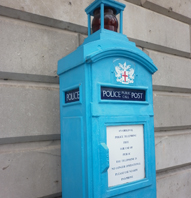The overwhelming majority of police officers and staff are honest and professional. However inspectors are concerned that some forces aren’t seeking out and working to prevent corruption, says Her Majesty’s Inspectorate of Constabulary (HMIC). A report, ‘Integrity Matters’, sets out HMIC’s findings on the capability of police forces in England and Wales to tackle misconduct.
HMI Mike Cunningham said: “When we spoke to police officers and staff it was clear that chief officer teams are demonstrating their commitment to addressing misconduct and corruption. Police officers were also quick to tell us that they see corrupt colleagues as a betrayal of the vast majority who are honourable, decent and hard-working. We found no evidence to suggest corruption was endemic but we know only too well that the corrosive nature of corruption means that even a single case can be damaging to public confidence. Police forces have made great strides in tackling misconduct and corruption and now they need to continue that work to focus on proactive, prevention work. At the moment over half of police forces are not seeking out intelligence on corruption proactively; this is a clear area for improvement where they can continue to demonstrate a culture of zero tolerance for misconduct and corruption.”
The College of Police’s Code of Ethics, the register for chief officer gifts and hospitality and the disapproved register which prevents the re-employment of staff who have resigned whilst facing gross misconduct charges or have been dismissed for gross misconduct have all contributed to tackling integrity and corruption, say inspectors.
HMIC found that it was impossible to accurately determine the extent of corruption as there is no single agreed definition of what corruption is and forces are not obliged to record if a complaint or allegation of misconduct involves corruption. Whilst there are various criminal offences in place, police corruption means different things to different people.
Police forces gather information about misconduct and potential police corruption from public complaints, internal misconduct reports and intelligence. Only a small proportion of public complaints and internal misconduct reports relate to corrupt activity. However police forces must continue vigilance as cases can have a disproportionate effect on public confidence. Currently around half of forces do not have the capability to actively seek out and develop intelligence on corruption.
Police officers themselves are encouraged to raise concerns about unethical or illegal activity amongst their colleagues and HMIC found that they were prepared to do so. HMIC said that it was encouraging to find that leadership on this issue was generally considered to be very good, with over three quarters of 17,200 officers and staff surveyed agreeing that the senior team encourages officers and staff to challenge activities or behaviours that are unethical, unacceptable, or illegal. However, only just over half of the officers and staff surveyed said they trusted the confidentiality of internal reporting; and this may affect the information and intelligence that forces receive.
HMIC says that it’s confident that police forces are addressing misconduct and corruption, despite budget cuts the majority have maintained or increased staffing in professional standards departments and anti-corruption units. Last year there were over 3,000 investigations into offences most likely to have involved corruption which resulted in up to in excess of 900 police officers and staff either facing disciplinary sanctions or leaving the service.
The way that corruption is dealt with within police forces varied. Public concern generated by a number of recent reports into police corruption means that the police should have a clear understanding of the threat posed by police corruption and a standard approach to prevent and tackle it, says HMIC.
The report makes 15 recommendations which says HMIC will lead to greater clarity and consistency in prevention and identification of corruption. To read the 226-page report visit – http://www.justiceinspectorates.gov.uk/hmic/publication/integrity-matters/
ACPO view
National Policing Lead on Police Standards and Ethics, Chief Constable Jacqui Cheer said: “The public rightly expects the service and those within it to operate with transparency and to the highest standards of integrity. Chief officers around the country devote considerable energy and resource to identifying risks and promoting integrity within their forces. We have made progress in 122 of the 125 areas previously identified by HMIC as needing improvement. Chief constables are engaging with officers and staff at all levels; many are personally hosting events with the opportunity for questions and discussion.
“We welcome the call for a single definition of ‘corruption’ in the police context. This would give much clearer parameters and guidance to the public and those tackling police corruption as to what constitutes unacceptable behaviour. Corruption is neither endemic nor widespread in the police service. However, the actions of a few corrupt officers can corrode the reputation of the vast majority who work hard every day to protect the public. We will continue to improve our approach so that those who are not fit to be in the police are held to account and removed.”










